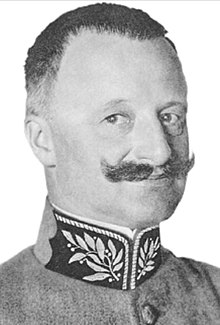Emil Sonderegger

Emil Sonderegger (born 28 November 1868 in
The son of leading
He went on to work for Schweizerische Industriegesellschaft Neuhausen and an arms manufacturer, as well as conducting a lecture tour of
He became a keen reader of the Schweizerische Monatshefte and its editor Hans Oehler gained something of a coup in 1933 when he convinced the national hero to join the National Front.[1] Using his military skills, he played a leading role in transforming the front from a discussion group into a force in street politics, although he became disillusioned with the inertia of the Front and in 1933 left the group with Ernst Leonhardt to form the Volksbund.[1] By February of the following year Sonderegger and Leonhardt had split, with Sonderegger forming his own Volksfront.[1] He died later that same year, with his group absorbed by the Eidgenössische Front.[1]
Further reading
- René Zeller: Emil Sonderegger. Vom Generalstabschef zum Frontenführer. Verlag Neue Zürcher Zeitung, Zurich 1999 ISBN 3-85823-792-2
References
- ^ a b c d e f g h i j k Philip Rees, Biographical Dictionary of the Extreme Right Since 1890, Simon & Schuster, 1990, p. 365
- ^ Hans A. Schmitt, Neutral Europe Between War and Revolution, 1917–23, University Press of Virginia, 1988, p. 68
- ^ Jean-François Bergier, Switzerland, National Socialism, and the Second World War, Berghahn Books, 2002, p. 208
